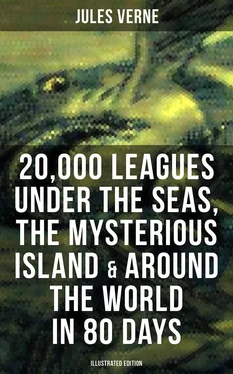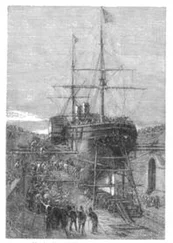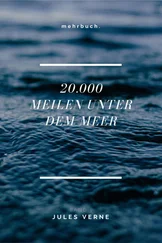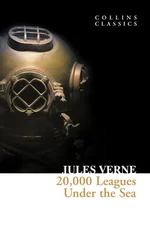For two hours our fishing proceeded energetically but without bringing up any rarities. Our dragnet was filled with Midas abalone, harp shells, obelisk snails, and especially the finest hammer shells I had seen to that day. We also gathered in a few sea cucumbers, some pearl oysters, and a dozen small turtles that we saved for the ship’s pantry.
But just when I least expected it, I laid my hands on a wonder, a natural deformity I’d have to call it, something very seldom encountered. Conseil had just made a cast of the dragnet, and his gear had come back up loaded with a variety of fairly ordinary seashells, when suddenly he saw me plunge my arms swiftly into the net, pull out a shelled animal, and give a conchological yell, in other words, the most piercing yell a human throat can produce.
“Eh? What happened to master?” Conseil asked, very startled. “Did master get bitten?”
“No, my boy, but I’d gladly have sacrificed a finger for such a find!”
“What find?”
“This shell,” I said, displaying the subject of my triumph.
“But that’s simply an olive shell of the ‘tent olive’ species, genus Oliva, order Pectinibranchia, class Gastropoda, branch Mollusca—”
“Yes, yes, Conseil! But instead of coiling from right to left, this olive shell rolls from left to right!”
“It can’t be!” Conseil exclaimed.
“Yes, my boy, it’s a left-handed shell!”
“A left-handed shell!” Conseil repeated, his heart pounding.
“Look at its spiral!”
“Oh, master can trust me on this,” Conseil said, taking the valuable shell in trembling hands, “but never have I felt such excitement!”
And there was good reason to be excited! In fact, as naturalists have ventured to observe, “dextrality” is a well-known law of nature. In their rotational and orbital movements, stars and their satellites go from right to left. Man uses his right hand more often than his left, and consequently his various instruments and equipment (staircases, locks, watch springs, etc.) are designed to be used in a right-to-left manner. Now then, nature has generally obeyed this law in coiling her shells. They’re right-handed with only rare exceptions, and when by chance a shell’s spiral is left-handed, collectors will pay its weight in gold for it.
So Conseil and I were deep in the contemplation of our treasure, and I was solemnly promising myself to enrich the Paris Museum with it, when an ill-timed stone, hurled by one of the islanders, whizzed over and shattered the valuable object in Conseil’s hands.
I gave a yell of despair! Conseil pounced on his rifle and aimed at a savage swinging a sling just ten meters away from him. I tried to stop him, but his shot went off and shattered a bracelet of amulets dangling from the islander’s arm.
“Conseil!” I shouted. “Conseil!”
“Eh? What? Didn’t master see that this man-eater initiated the attack?”
“A shell isn’t worth a human life!” I told him.
“Oh, the rascal!” Conseil exclaimed. “I’d rather he cracked my shoulder!”
Conseil was in dead earnest, but I didn’t subscribe to his views. However, the situation had changed in only a short time and we hadn’t noticed. Now some twenty dugout canoes were surrounding the Nautilus. Hollowed from tree trunks, these dugouts were long, narrow, and well designed for speed, keeping their balance by means of two bamboo poles that floated on the surface of the water. They were maneuvered by skillful, half-naked paddlers, and I viewed their advance with definite alarm.
It was obvious these Papuans had already entered into relations with Europeans and knew their ships. But this long, iron cylinder lying in the bay, with no masts or funnels—what were they to make of it? Nothing good, because at first they kept it at a respectful distance. However, seeing that it stayed motionless, they regained confidence little by little and tried to become more familiar with it. Now then, it was precisely this familiarity that we needed to prevent. Since our weapons made no sound when they went off, they would have only a moderate effect on these islanders, who reputedly respect nothing but noisy mechanisms. Without thunderclaps, lightning bolts would be much less frightening, although the danger lies in the flash, not the noise.
Just then the dugout canoes drew nearer to the Nautilus, and a cloud of arrows burst over us.
“Fire and brimstone, it’s hailing!” Conseil said. “And poisoned hail perhaps!”
“We’ve got to alert Captain Nemo,” I said, reentering the hatch.
I went below to the lounge. I found no one there. I ventured a knock at the door opening into the captain’s stateroom.
The word “Enter!” answered me. I did so and found Captain Nemo busy with calculations in which there was no shortage of X and other algebraic signs.
“Am I disturbing you?” I said out of politeness.
“Correct, Professor Aronnax,” the captain answered me. “But I imagine you have pressing reasons for looking me up?”
“Very pressing. Native dugout canoes are surrounding us, and in a few minutes we’re sure to be assaulted by several hundred savages.”
“Ah!” Captain Nemo put in serenely. “They’ve come in their dugouts?”
“Yes, sir.”
“Well, sir, closing the hatches should do the trick.”
“Precisely, and that’s what I came to tell you—”
“Nothing easier,” Captain Nemo said.
And he pressed an electric button, transmitting an order to the crew’s quarters.
“There, sir, all under control!” he told me after a few moments. “The skiff is in place and the hatches are closed. I don’t imagine you’re worried that these gentlemen will stave in walls that shells from your frigate couldn’t breach?”
“No, captain, but one danger still remains.”
“What’s that, sir?”
“Tomorrow at about this time, we’ll need to reopen the hatches to renew the Nautilus’s air.”
“No argument, sir, since our craft breathes in the manner favored by cetaceans.”
“But if these Papuans are occupying the platform at that moment, I don’t see how you can prevent them from entering.”
“Then, sir, you assume they’ll board the ship?”
“I’m certain of it.”
“Well, sir, let them come aboard. I see no reason to prevent them. Deep down they’re just poor devils, these Papuans, and I don’t want my visit to Gueboroa Island to cost the life of a single one of these unfortunate people!”
On this note I was about to withdraw; but Captain Nemo detained me and invited me to take a seat next to him. He questioned me with interest on our excursions ashore and on our hunting, but seemed not to understand the Canadian’s passionate craving for red meat. Then our conversation skimmed various subjects, and without being more forthcoming, Captain Nemo proved more affable.
Among other things, we came to talk of the Nautilus’s circumstances, aground in the same strait where Captain Dumont d’Urville had nearly miscarried. Then, pertinent to this:
“He was one of your great seamen,” the captain told me, “one of your shrewdest navigators, that d’Urville! He was the Frenchman’s Captain Cook. A man wise but unlucky! Braving the ice banks of the South Pole, the coral of Oceania, the cannibals of the Pacific, only to perish wretchedly in a train wreck! If that energetic man was able to think about his life in its last seconds, imagine what his final thoughts must have been!”
As he spoke, Captain Nemo seemed deeply moved, an emotion I felt was to his credit.
Then, chart in hand, we returned to the deeds of the French navigator: his voyages to circumnavigate the globe, his double attempt at the South Pole, which led to his discovery of the Adélie Coast and the Louis-Philippe Peninsula, finally his hydrographic surveys of the chief islands in Oceania.
Читать дальше












